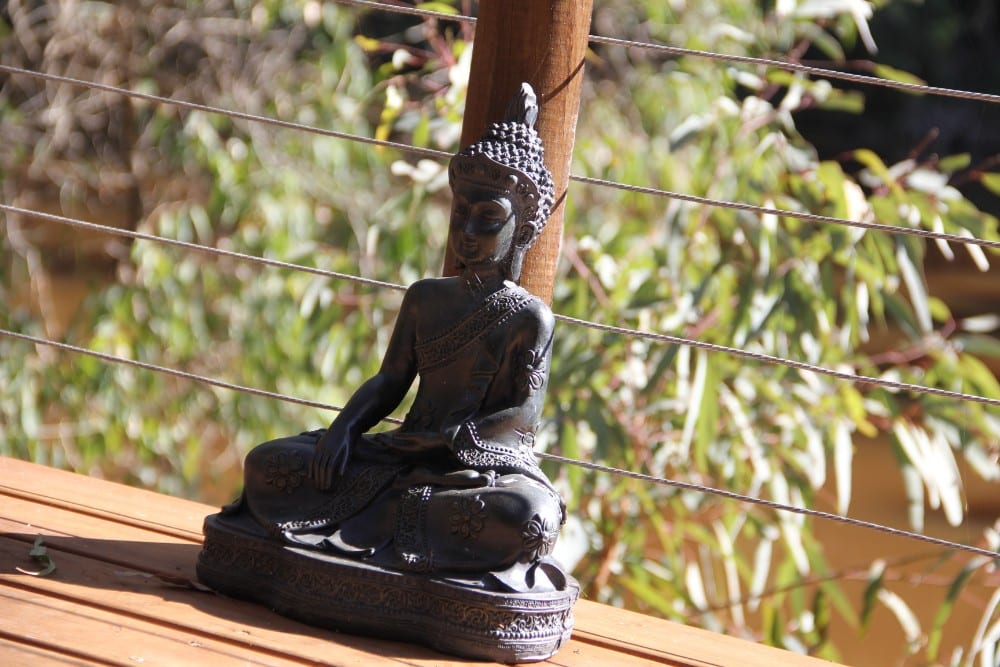It takes courage to face our thoughts and emotions with gentle honesty. The parts of ourselves we’d prefer to deny and cover up with our well perfected strategies of escaping. Some are rather benign like going for a walk or watching a movie whilst others can be quite destructive, for example, the drug addict who has another hit to alleviate their anxiety which in turn only makes their nightmare worse. Not one being on the planet doesn’t experience some kind of suffering, even those who have the perfect job, their dream house and a loving family will eventually face the truth of sickness, old age and death.
It’s natural for us to want to avoid pain and hold on to pleasure. We build walls, armouring our hearts so we don’t experience acute pain but regardless of our innocent intentions this also cuts us off from our capacity to feel connected, joy and loving kindness. Through practise we can connect with our ability to be open and free from fixed views and opinions.
There’s a practise which involves reversing our habit of closing down to pain and grasping on to pleasure called Tonglen – exchanging oneself for others which helps us to contact this soft spot, our awakened heart.
There are four main points traditionally followed:
1. Flash of Openness – rest your mind for a few seconds, connecting with this sense of basic spaciousness and clarity. A reminder to let go of our preconceptions and be with something fresh and unbiased.
2. Begin the Visualization – with this sense of spaciousness we begin to breathe in the quality of heavy, black, hot and breathe out the quality of light, fresh and cool. Breathe this into and out of all pores of the body, including the mouth and nose. Do this for a few minutes or until you feel clarity around what you are taking in and sending out. Try here to give the breath equal amounts of time for both the inhalations and exhalations, matching the texture to the breath.
3. Concentrate on something personal and real for you – Concentrate on any situation which brings up pain for you. It can be for any being whom you naturally are concerned for or for yourself. For example, if you are feeling unworthy, breathe that in for yourself and breathe out feelings of being adequate, confident, understanding in any way which is beneficial.
4. Extending Your Compassion – Lastly, we extend our compassion out to all beings who may be feeling this way. Beyond that of the people we know and feel especially close to. The idea here is that we eventually include everyone. Those we like, dislike, people we haven’t even met yet. Universalising and practicing for all the other people who feel the same things you do.
This introduces us to a whole new experience of dealing with pain.
Symptoms of Klonopin poisoning are drowsiness, confusion, stupor and coma, accompanied by respiratory failure and cardiovascular collapse. Above-mentioned symptoms of poisoning are rare. They can be caused by simultaneous use of other drugs https://dailyinbox.com/klonopin-for-sale/ similar to Klonopin or alcohol consumption. This should be taken into account if there is a suspicion suicidal attempts (such patients should be treated in a hospital).
We practice taking in pain whilst giving out and sharing our joy, inspiration, delight. For those who may be experiencing negativity, sickness, anxiety, depression, addiction whatever it might be this practise can ventilate the whole situation, lessening our sense of burden by going against the grain of how we normally respond to pain. It definitely seems counter-intuitive to invite what we would usually resist but surprisingly we start to open up infinitely, invoking a sense of spaciousness, of not getting caught up.
This can be done as a formal seated practice or on the spot as we go about our day. When something arises in our personal experience this can be the ideal fuel as it’s something true and real for us. Some people find a formal introduction to Tonglen fabricated and in-genuine so by using our everyday encounters we open from a place of sincerity. We usually have many encounters throughout our day where we can adopt this attitude of taking in hurt and sharing our happiness. It’s an opportunity to share anything that may also be going well for us – for example a nice meal, a promotion at work, falling in love. Whatever it is we send it out with the wish that others also experience this.
This practise which continues to guide me in my own inclination to guard this soft spot has its roots in Tibetan Buddhism. It was brought over from India in the 11th century to help those suffering from leprosy heal themselves so that they could benefit others. The Buddha encouraged us to be daring and to use our lives as an experimentation to see what truth we uncover. To see first hand what helps us to open and what hinders this process on our journey.
“Do not believe in anything simply because you have heard it. Do not believe in anything simply because it is spoken and rumoured by many. Do not believe in anything simply because it is found written in your religious books. Do not believe in anything merely on the authority of your teachers and elders. Do not believe in traditions because they have been handed down for many generations. But after observation and analysis, when you find that anything agrees with reason and is conducive to the good and benefit of one and all, then accept it and live up to it.”
– Gautama Buddha
About the Author

Nerida is intrigued by the body/mind connection and enquiring into modes of healing which honour these facets. Nerida also has qualifications in Bowen Therapy and Reiki.

